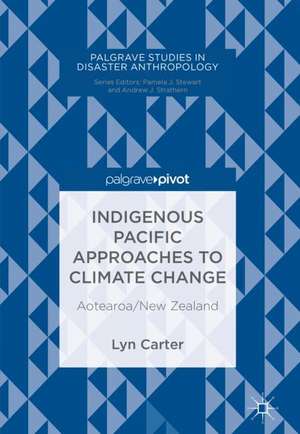Indigenous Pacific Approaches to Climate Change: Aotearoa/New Zealand: Palgrave Studies in Disaster Anthropology
Autor Lyn Carteren Limba Engleză Hardback – 31 aug 2018
Preț: 419.06 lei
Nou
Puncte Express: 629
Preț estimativ în valută:
80.23€ • 83.71$ • 67.25£
80.23€ • 83.71$ • 67.25£
Carte tipărită la comandă
Livrare economică 13-27 martie
Preluare comenzi: 021 569.72.76
Specificații
ISBN-13: 9783319964386
ISBN-10: 3319964380
Pagini: 100
Ilustrații: XXI, 106 p. 3 illus., 2 illus. in color.
Dimensiuni: 148 x 210 x 15 mm
Greutate: 0.36 kg
Ediția:1st ed. 2019
Editura: Springer International Publishing
Colecția Palgrave Pivot
Seria Palgrave Studies in Disaster Anthropology
Locul publicării:Cham, Switzerland
ISBN-10: 3319964380
Pagini: 100
Ilustrații: XXI, 106 p. 3 illus., 2 illus. in color.
Dimensiuni: 148 x 210 x 15 mm
Greutate: 0.36 kg
Ediția:1st ed. 2019
Editura: Springer International Publishing
Colecția Palgrave Pivot
Seria Palgrave Studies in Disaster Anthropology
Locul publicării:Cham, Switzerland
Cuprins
Chapter 1. Introduction.- Chapter 2. Setting the Scene.- Chapter 3. Traditional Ecological Knowledge and Climate Change.- Chapter 4. Aotearoa/New Zealand and Land-use Change.- Chapter 5. New Zealand and the Emissions Trading Scheme.- Chapter 6. Aotearoa/New Zealand Adaptation Strategies and Practices.- Chapter 7. Where to From Here?Learning from our Pacific Neighbours.
Recenzii
“Readers from social and cultural anthropology, indigenous studies and other related disciplines interested in the topic of climate change will find Lyn Carter’s study an interesting read. … The combination of institutional analysis and information from case studies provides interesting insights to both scholars, indigenous people, and policymakers in New Zealand, Oceania, and beyond.” (Lena Borlinghaus, Anthropological Notebooks, Vol. 25 (1), 2019)
Notă biografică
Lyn Carter is Senior Lecturer in Te Tumu (the School of Māori, Pacific and Indigenous Studies) at the University of Otago, New Zealand.
Textul de pe ultima copertă
“A key text for climate change, New Zealand Studies, Māori Studies, and Indigenous Studies, for both academics and a wider readership interested in these debates. Lyn Carter skillfully moves through a wide range of issues, providing a discussion that is focused, fresh, original, and accessible.”
—Ian Conrich, Professorial Fellow, University of Vienna, Austria
Situating Māori Ecological Knowledge (MEK) within traditional environmental knowledge (TEK) frameworks, this book recognizes that indigenous ecological knowledge contributes to our understanding of how we live in our world (our world views), and in turn, how we adapt to climate change. As an industrialized nation, Aotearoa/New Zealand (A/NZ) has responsibilities and obligations to other Pacific dwellers, including its indigenous populations. In this context, Lyn Carter discusses how A/NZ can benefit from the wider Pacific strategies already in place; how to meet its global obligations to reducing greenhouse gases; and how A/NZ can utilize MEK to achieve substantial inroads into long-term adaptation strategies and sustainable practices. Carter demonstrates that in all respects Māori tribal groups are well-placed to be key players: adaptation strategies, policies, and practices are integrated throughout Māori/Iwi traditional knowledge.
Lyn Carter is Senior Lecturer in Te Tumu (the School of Māori, Pacific and Indigenous Studies) at the University of Otago, New Zealand.
—Ian Conrich, Professorial Fellow, University of Vienna, Austria
Situating Māori Ecological Knowledge (MEK) within traditional environmental knowledge (TEK) frameworks, this book recognizes that indigenous ecological knowledge contributes to our understanding of how we live in our world (our world views), and in turn, how we adapt to climate change. As an industrialized nation, Aotearoa/New Zealand (A/NZ) has responsibilities and obligations to other Pacific dwellers, including its indigenous populations. In this context, Lyn Carter discusses how A/NZ can benefit from the wider Pacific strategies already in place; how to meet its global obligations to reducing greenhouse gases; and how A/NZ can utilize MEK to achieve substantial inroads into long-term adaptation strategies and sustainable practices. Carter demonstrates that in all respects Māori tribal groups are well-placed to be key players: adaptation strategies, policies, and practices are integrated throughout Māori/Iwi traditional knowledge.
Lyn Carter is Senior Lecturer in Te Tumu (the School of Māori, Pacific and Indigenous Studies) at the University of Otago, New Zealand.


